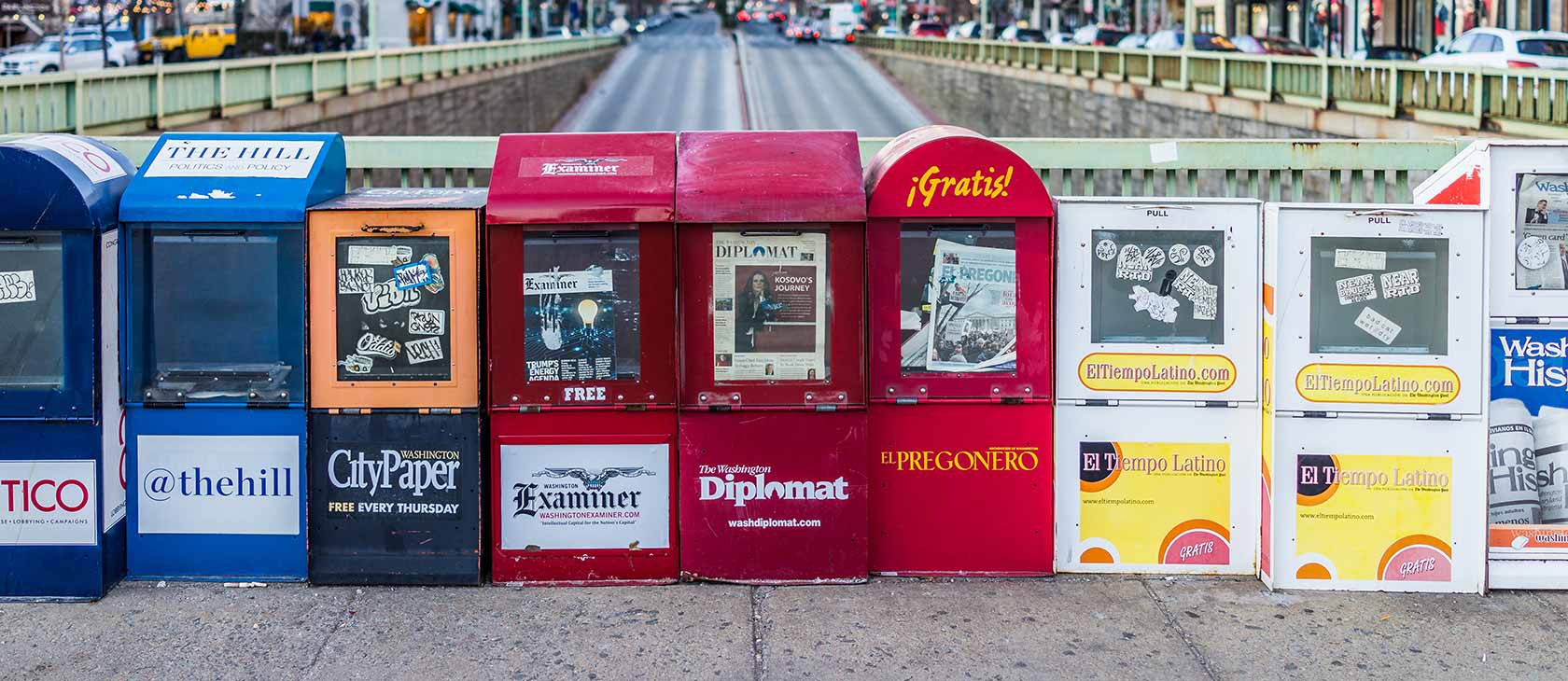Anyone alive before the internet – a time difficult to grasp by anyone in school today – remembers getting information by reading newspapers. In today’s parlance, they are the “dead tree” edition of a publication usually viewed online. The Sunday editions of newspapers then were particularly wondrous: multiple sections, thick want ads, extended essays, big comics in color. The added weight was a particular challenge for kids (it was almost always kids, then) who delivered papers in darkness, rain, and snow.
In that ancient world, papers were filled with news. There were stories, lots of them, the writing of which was overseen by editors. Accuracy was a virtue. Top reporters at major publications were influential enough to bring down the titans of business, culture, and politics. Even then the media was liberal, to be sure, but the Fourth Estate also helped hold the powerful accountable.
That world has disappeared. Newspaper circulation has collapsed. Papers have folded, merged, diminished, and otherwise compromised on missions and resources. Published magazines have followed their lead. Online sources have diversified and expanded the voices available, but net surfers resist paying, even for what purports to be serious journalism. For many publications an online presence only complicated the financial challenge, which leaves even the most widely read and oldest publications searching for a sustainable economic model.
Overall, about one-third of journalism jobs have disappeared over the last eight years.
These problems appear to be worldwide. Hundreds of publications have closed in Canada. Even those which survive have sold off property, reduced activities, and laid off staff. Overall, about one-third of journalism jobs have disappeared over the last eight years.
Now from Ottawa, Canada, comes the cry: We are from the government, and we want to help you! Prime Minister Justin Trudeau’s Liberal administration is offering public support for private publications. In late 2018, officials began exploring “models that would allow private giving or philanthropic support for nonprofit journalism and local news.”
The government advanced a set of proposals estimated to cost $675 million Canadian dollars, or about $600 million U.S. First would be a tax credit for online subscribers. The objective: to create a “more financially sustainable business model.” Presumably, more people would spend more money for news if Ottawa bore part of the cost.
Second, journalism nonprofits could become “qualified donees,” allowing their benefactors to take a tax write-off. Moreover, charitable foundations would be able to offer support, as well.
Third, enterprises that “produce a wide variety of news and information of interest to Canadians” would receive a refundable tax credit for the cost of labor engaged in creating “original content.” That is, the government would pay newspapers for hiring journalists even in the event that no tax was owed. An industry panel would decide who was eligible for this lucrative deal.
The idea of rescuing presumably valuable news agencies has obvious appeal. So does saving the jobs of talented writers. However, a government bailout raises important issues. Advocates point to existing taxpayer-supported media, which, alas, is not reassuring. For instance, National Public Radio in the U.S. might be editorially independent, but that doesn’t mean it is objective and nonpartisan. Why taxpayers should be forced to fund an agency arrayed against their beliefs has never been clear.
Indeed, that is one of the objections to the Trudeau proposal. Culturally and politically, the government plans a taxpayer rescue of friendly journalists, who are likely to return the favor in future reporting. “Justin Trudeau and this system he’s setting up will determine whether your mortgage gets paid. And you say that will have absolutely no impact on the nature of your coverage?” complained Conservative MP Pierre Poilievre. “I think you can forgive us for being just a little skeptical about that claim.”
Increased bias is likely to result not so much from flagrant quid pro quo as reinforcement of shared assumptions and beliefs. The media generally lean left. As a left-leaning government transfers public resources to left-leaning journalists, the latter are unlikely to shift right.
Forcing taxpayers to fund a media assault on their deeply held views, informed by faith, is unjust and immoral.
That raises perhaps the most significant objection to the scheme yet: This exercise would be fundamentally unfair to those dispossessed of their money. Taxpayers obviously are forced to fund many programs which they do not believe in. However, in most cases the activity, such as care for the poor, is not intrinsically contrary to their beliefs. Here, however, they are expected to underwrite someone who may attack their personal, political, moral, and religious beliefs. Forcing taxpayers to fund a media assault on their deeply held views, informed by faith, is unjust and immoral.
Whatever the argument about presumed public benefits of quality journalism, the cash would most directly enrich the media, publications and journalists alike. Already the latter have started battling over the booty. Martin O’Hanlon, president of press union CWA Canada, insisted his union has “to make sure that the money goes to the newspaper,” and that politicians “are not funneling it to go to their owners, to their investors. It’s got to go to quality journalism, ” by which, of course, he means to his union members.
Moreover, hooking journalists on public funds and turning them into quasi- public servants undermines innovation and creative business planning within the industry. Journalists will simply have less incentive to search for private solutions to their financial dilemmas. If Ottawa is going to make it easy, why put in extra effort? That in turn creates a danger for the industry’s future survival. Another government, presumably not headed by the undoubtedly virtuous Trudeau, might threaten to end support if news coverage did not “improve” its tone.
Nor does the regulatory role accorded the industry offer protection from abuse. In fact, the U.S. has a history of professional regulation, starting with doctors and lawyers, in which the rules inevitably are written to advantage incumbents and limit competition. Publications which exist have greater clout than those which have not yet been created. A subsidy scheme could both discourage innovation and encourage favoritism.
Journalism is in trouble. However, government subsidies are not the answer. They aren’t fair to everyone else, many of whom may face their own economic and employment challenges. And such benefits offer multiple opportunities for abuse. Having spent years insisting that they are all that stand between people and tyranny, media organizations should resist the Sirens’ call of government support.




